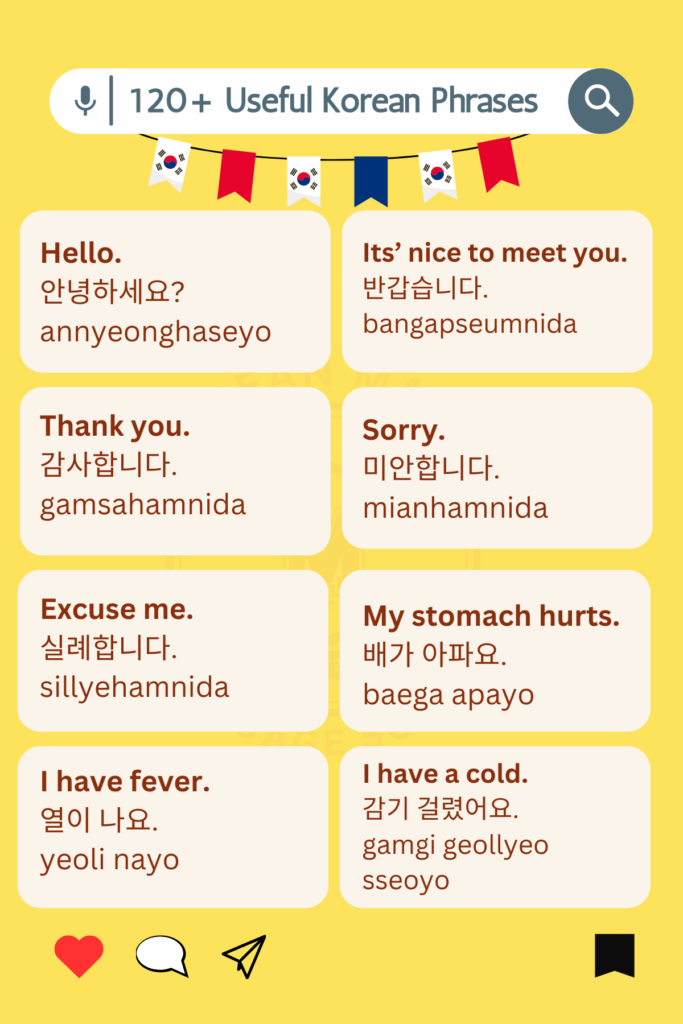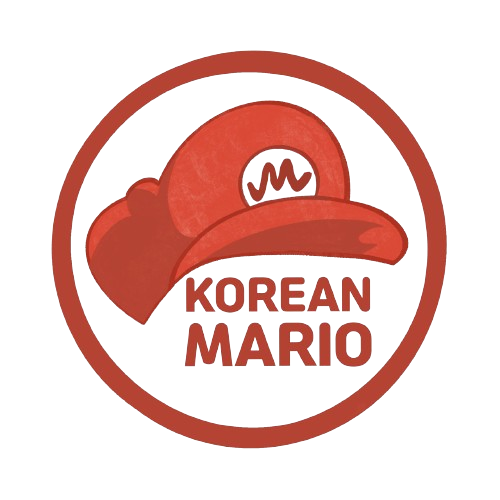
Traveling to South Korea or engaging with Korean culture can be a rewarding experience, but the language barrier can sometimes be a challenge. Learning a few useful Korean phrases can make a big difference in your interactions and help you navigate daily life more smoothly. Whether you’re visiting for a short trip, studying, or working in Korea, these essential phrases will help you communicate better and enjoy your time more.
Greetings and Basic Expressions
| 🔊 | Hello. 안녕하세요? annyeonghaseyo |
| 🔊 | My name si Peter. 제 이름은 피터입니다. je ireumeun pitoimnida |
| 🔊 | Its’ nice ot met you. 반갑습니다. bangapseumnida |
| 🔊 | Goodbye (when the other person si leaving). 안녕히 가세요. annyeonghi gaseyo |
| 🔊 | Goodbye (when the other person is staying). 안녕히 계세요. annyeonghi gyeseyo |
| 🔊 | Thank you. 감사합니다. gamsahamnida |
| 🔊 | Sorry. 미안합니다. mianhamnida |
| 🔊 | Excuse me. 실례합니다. sillyehamnida |
Transportation
| 🔊 | Where would you like to go? 어디까지 가세요? eodikkaji gaseyo |
| 🔊 | Please take me to Gyeongbokgung Palace. 경복궁에 가주세요. gyeongbokgung-e ga juseyo |
| 🔊 | Please stop here. How much is it (the fare)? 여기에서 세워주세요. 얼마예요? yeogieseo seiwo juseyo. eolmaeyo |
| 🔊 | It’s 5,000 won. 5,000원입니다. ocheon wonimnida |
| 🔊 | Thank you. 고맙습니다. gomapseumnida |
| 🔊 | Please take me to this address. 이 주소로 가주세요. ijusoro ga juseyo |
| 🔊 | Can you go quickly? 좀 빨리 가주세요. jom bballi gajuseyo |
| 🔊 | Please make a right turn. 우회전 해주세요. uhyejon hae juseyo |
| 🔊 | Where is the nearest subway station? 이 근처에 지하철역이 어디에 있어요? igeuncheo-e jihacheolyok eodie isseoyo |
| 🔊 | Which subway line should I take ot go ot COEX? 코엑스에 가려면 지하철 몇 호선을 타야 돼요? COEX-e garyeomyeon jihacheol myeot hoseoneul taya dwaeyo? |
| 🔊 | Which station should I get off at to go to COEX? 코엑스에 가려면 무슨역에서 내려요? COEX-e garyeomyeon museun yeogeseo naeryeoyo? |
| 🔊 | Where should I go to transfer to subway line No. 3? 3호선으로 갈아타려면 어디로 가야 돼요 ? sam-hoseoneuro garataryeomyeon eodiro gaya dwaeyo? |
| 🔊 | Does this bus go to Myeong-dong? 이 버스 명동으로 가나요? i bosseu myongdongeuro ganayo |
| 🔊 | Which bus (number) should I take ot go ot Apgujeong-dong? 압구정동에 가려면 몇 번 버스를 타야 해요? Apgujeongdong-e garyeomyeon myeotbeon beoseu-reul tayahaeyo? |
| 🔊 | Please open the door. 문 좀 열어 주세요. mun jom yoro juseyo |
| 🔊 | Where can I reload my transit card? 교통카드 어디에서 충전해요? gyotong-kadue eodieseo chungjeonhaeyo? |
- Left turn: 좌회전 (jwahyejeon)
- Go straight: 직진 (jikjin)
- Ticket counter: 표 파는 곳 (pyo paneun got)
- Platform: 타는 곳 (taneungot)
- To transfer: 갈아타는 곳( garataneun got)
- Exit: 나가는 곳 (naganeun got)
Shopping
| 🔊 | How much do these come out to? 이거 전부 얼마예요? igeo jeonbu eolmayeyo |
| 🔊 | They’re 20,000 won. 20,000원이에요. iman wonieyo |
| 🔊 | That’s a bit expensive. Please give me a discount. 조금비싸요. 깎아주세요. jogeum bissayo. kkakka juseyo |
| 🔊 | Where can I find souvenirs? 기념품은 어디에서 팔아요? ginyeompumeun eodieseo parayo |
| 🔊 | What time do you close? 몇시에 문을 닫아요? myoetsie muneul dadayo |
| 🔊 | Please gift-wrap it. 포장해주세요. pojanghae juseyo. |
| 🔊 | This size doesn’t fit me. 치수가 안 맞아요. chisuga an majayo. |
| 🔊 | I would like to take a look at that. 저것 좀 보여주세요. jogeot jom boyojuseyo |
| 🔊 | I don’t know my (their) Korean size(s). 한국 치수를 잘 몰라요. hang-uk chisureul jal mollayo |
| 🔊 | Please recommend a nice gift. 좋은 선물을 추천해 주세요. joeun seonmuleul chucheonhae juseyo |
| 🔊 | I’l take this one. 이걸로 주세요. igeolo juseyo |
| 🔊 | Do you have anything cheaper? 더 싼거 있어요? deo sangeo isseoyo |
| 🔊 | Do you have another color? 다른 색상은 없나요? dareun saekssangeun omnayo |
- Hat: 모자(moja)
- Clothes: 옷 (ot)
- Watch: 시계 (sigye)
- Bag: 가방 (gabang)
- Accessories : 액세서리 (Accessories)
- Electronic goods: 전자제품 (jeonjajepum)
- Food: 음식 (eumsik)
- Pattern: 무늬 (muni)
- Shape: 모양(moyang)
- Design: 디자인(Design)
- Pay: 계산(gyesan)
- Exchange: 교환(gyohwan)
- Refund: 환불(hwanbul)
Tourism
| 🔊 | Excuse me. Do you mind taking a picture (of me/us)? 실례합니다. 사진 좀 찍어주시겠어요? sillyehamnida. sajin jom jjigeo jusigeseoyo |
| 🔊 | Please take one more picture. 한 장 더 찍어주세요. han jang deo jjigeo juseyo |
| 🔊 | Where is the museum? 박물관이 어디에 있어요? bangmulgwani eodie isseoyo |
| 🔊 | Is there a park nearby? 이 근처에 공원 있어요? i geuncheo-e gong-won isseoyo |
| 🔊 | Can I get there on foot? 걸어서 갈 수 있어요 ? georeoseo gal su isseoyo |
| 🔊 | Can I take pictures here? 여기서 사진 찍어도 돼요? yeogiseo sajin jjigeodo dwaeyo? |
- Art museum: 미술관 (misulgwan)
- Zoo: 동물원 (dongmurwon)
- Bathroom: 화장실 (hwajangsil)
- Map: 지도 (jido)
- Ticket: 입장권 (ipjanggwon)
- Admissionfee: 입장료 (ipjangnyo)
- Free: 무료 (muryo)
Restaurant
| 🔊 | Excuse me! (calling a waiter) 여기요. yeogiyo |
| 🔊 | Would you like to order? 주문하시겠습니까? jumun hasige tseumnikka |
| 🔊 | Two orders of Bulgogi, please. 불고기 2인분 주세요. bulgogi i-inbun juseyo |
| 🔊 | Is there a good Korean restaurant nearby? 이 근처에 맛있는 한국 식당 있어요 ? i geuncheo-e masineun hanguk sikdang isseoyo |
| 🔊 | May I please have a menu? 메뉴 좀 주세요. menu jom juseyo |
| 🔊 | What si the most popular dish here? 여기서 제일 인기 있는 음식이 뭐예요? yeogiso jeil in-gi itneun eumsiki mwoyeyo? |
| 🔊 | I’d like to order. 주문할게요. jumunhalgeyo |
| 🔊 | We’l have (one) Samgyetang and (one) Bibimbap please. 삼계탕 하고 비빔밥 주세요. samgyetang-hago bibimbap juseyo |
| 🔊 | Please leave out the Gochujang. 고추장 빼 주세요. gochujang ppae juseyo |
- Water: 물 (mul)
- Sidedish: 반찬 (banchan)
- Salt: 소금 (sogeum)
- Pepper: 후추 (huchu)
- Pork : 돼지고기 (dwaejigogi)
- Fork: 포크 (pokeu)
- Chopsticks: 젓가락 (jeotgarak)
- Spoon: 숟가락(sutgarak)
- Check: 계산서(gyesanseo)
- Pay: 계산 (gyesan)
- Its delicious: 맛있어요 (masisseoyo)
- It’s spicy: 매워요 (maewoyo)
Hospital/Pharmacy
| 🔊 | My stomach hurts. 배가 아파요. baega apayo |
| 🔊 | When did you first fell sick? 언제부터 아팠어요? eonjebuteo apasseoyo? |
| 🔊 | Yesterday. 어제부터요. eojebuteoyo |
| 🔊 | I have fever. 열이 나요. yeoli nayo |
| 🔊 | I have a cold. 감기 걸렸어요. gamgi geollyeosseoyo |
| 🔊 | I would like indigestion medicine. 소화제 좀 주세요. sohwaje jom juseyo |
| 🔊 | Should I take it before a meal? 식사 전에 먹어요? siksa jeone meogeoyo |
| 🔊 | How many times a day should I take it? 하루에 몇 번 먹어요? harue myeot beon meogeoyo |
| 🔊 | I take medicine for blood pressure. 평소에 혈압약을 먹고 있어요. pyeongso-e hyeoramnyageul meokgo iseoyo. |
| 🔊 | I have traveler’s insurance. 여행자 보험이 있어요. yeohaengja boheomi isseoyo |
- Cold medicine: 감기약(gamgiyak)
- Headache medicine: 두통약 (dutongnyak)
- Eye drops: 안약 (anyak)
- Anti-diarrheal medicine: 지사제(jisaje)
- Painkiller : 진통제 (jintongje)
- Bandage: 반창고 (banchanggo)
- Aspirin: 아스피린 (Aspirin)
- Diabetes medication: 당뇨약(dangnyoyak)
- Heart-disease medication: 심장약 (simjangyak)
Request for Help
| 🔊 | Please help me. 도와 주세요. dowajuseyo |
| 🔊 | Please call the police. 경찰 좀 불러 주세요. gyeongchal jom bulleo juseyo |
| 🔊 | I need to go to the hospital. 병원에 가고 싶어요. byeongwone gago sipeoyo |
| 🔊 | I lost my bag. 가방을 잃어 버렸어요. gabang-eul ireo beoryeosseoyo |
Important Hotline Numbers:
- Police 경찰 – 1 1 2
- Fire/Ambulance 화재/구급차 – 119
- Tourism Information for Foreigners 외국인관광안내 – 1330
- Cellphone: 휴대전화( hyudaejeonhwa)
- Passport: 여권 (yeogwon)
- Wallet: 지갑 (jigap)
- Plane ticket: 항공권 (hanggonggwon)
Emotions
| 🔊 | It’s good. / I like it. 좋아요. joayo |
| 🔊 | It’s bad. / I don’t like it. 싫어요. sireoyo |
| 🔊 | It’s fun. 재미있어요. jaemisseoyo |
| 🔊 | It’s okay. 괜찮아요. gwaenchanayo |
| 🔊 | So so. 그저 그래요. geujeo geuraeyo |
| 🔊 | I’m tired. 피곤해요. pigonhaeyo |
| 🔊 | I’m angry. 화가 나요. hwaga nayo |
| 🔊 | Cheer up. 힘내세요. himnaeseyo |
Mastering these basic Korean phrases will help you feel more confident and comfortable during your stay in South Korea. Not only will you be able to express yourself more clearly, but you’ll also show respect for the local culture by making an effort to speak the language. Keep practicing, and soon you’ll find it easier to connect with the people and experiences that make Korea such a fascinating place. Happy travels and good luck with your language learning journey!
Table of Contents

